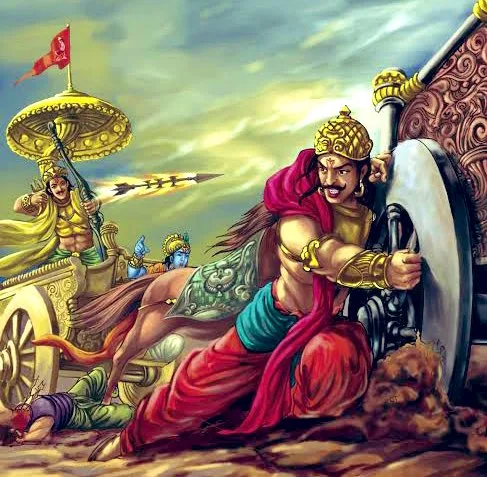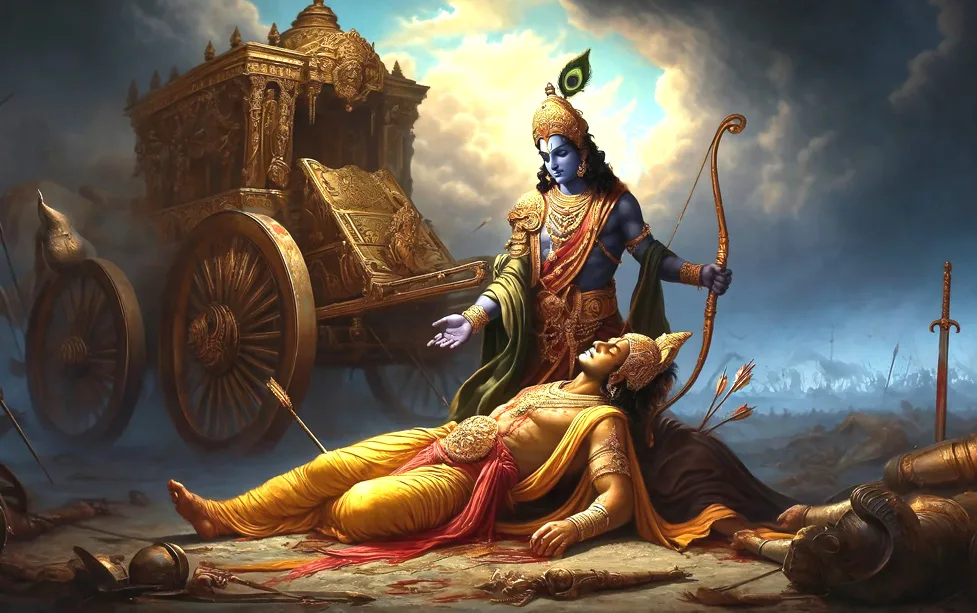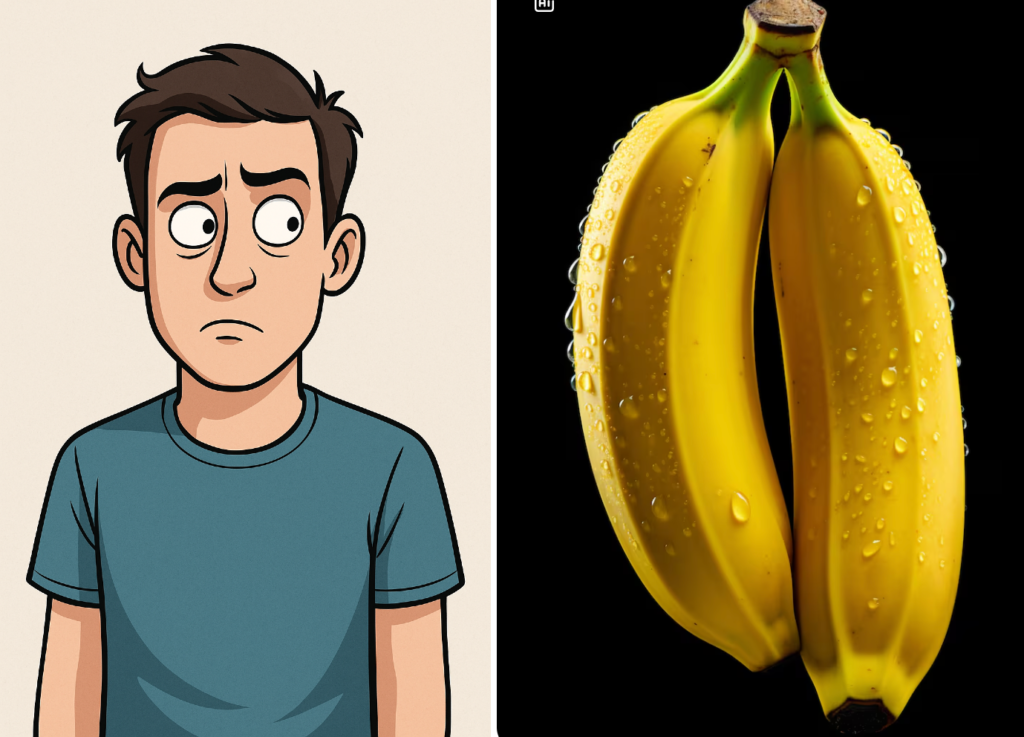Did you know that Krishna asked Karna to give his entire set of teeth on the battlefield of Kurukshetra? Those familiar with the Mahabharata may recall that when Karna’s chariot got stuck in the mud and he stepped down to retrieve its trapped wheel, Krishna intended for him to be killed at that very moment. According to the rules of warfare, it was forbidden to kill an unarmed warrior. The battle had to pause while the warrior was unarmed and could only resume once they were ready for combat.
Arjuna, fully aware of these principles, was initially reluctant to draw his bow. Despite being a flawless Kshatriya and a disciplined warrior, he hesitated to attack an unarmed opponent. However, in the end, he had to obey Krishna, his mentor. In the tradition of unquestioning loyalty to a guru’s advice, Arjuna, with a heavy heart, released his arrow and killed Karna while he was still struggling with his chariot.
But the question remains: why did Krishna instruct Arjuna to kill Karna deceitfully, and why did he ask for Karna’s entire set of teeth as Karna lay dying on the battlefield? What was the purpose behind this act?
In this blog, we will explore the deeper meanings hidden in the texts of the epic Mahabharata, revealing some surprising and lesser-known truths, along with intriguing backstories behind certain actions. But before we dive into the reasons and facts behind these events, let’s first look at the background of Karna’s fateful battle with Arjuna at Kurukshetra.

Source: Disney+Hotstar | Karna
The Mahabharata
The Mahabharata, one of the greatest epics in world literature, is an ancient Indian text that conveys a wide range of philosophical, ethical, and social teachings. Central to the story is the conflict between the Pandavas and the Kauravas—two branches of the Kuru dynasty—culminating in the great war on the battlefield of Kurukshetra. The text, attributed to the sage Vyasa, spans generations of conflict, sacrifice, and moral dilemmas, with the Kurukshetra War becoming the ultimate test of dharma (righteousness) and adharma (unrighteousness).
The Pandavas, the five sons of King Pandu—Yudhishthira, Bhima, Arjuna, Nakula, and Sahadeva—were rightful heirs to the throne of Hastinapura. However, their cousins, the Kauravas, led by the eldest Duryodhana, refused to grant them even a portion of the kingdom. This refusal, born from jealousy and desire, led to an escalating series of events that forced the Pandavas into exile. Even after serving their time in the wilderness, the Kauravas denied them any share of the kingdom, leading to the war as the last recourse to settle the dispute.
The Kurukshetra War: A Test of Dharma
The war was not simply about a fight for the kingdom. It was deeply tied to the cosmic order of dharma and justice. Both sides were filled with some of the greatest warriors of the time, including Bhishma, Dronacharya, and Karna for the Kauravas, and Arjuna, Bhima, and Krishna, who acted as Arjuna’s charioteer, for the Pandavas.
Before the war, Krishna, knowing that war was inevitable, made one last attempt to broker peace, but Duryodhana remained adamant. Consequently, Krishna gave his divine support to the Pandavas, promising that he would not take up arms but would assist them with his wisdom. The war, which lasted for 18 days, was filled with moral complexities, with both sides using strategies that blurred the lines of fair play.
One of the most poignant moments in the war was the encounter between Karna and Arjuna, two of the most formidable warriors on either side, whose destinies were intertwined in a complex web of fate, rivalry, and kinship.
The Tragic Hero Karna
Karna is perhaps one of the most tragic figures in the Mahabharata. Born to Kunti, the mother of the Pandavas, before her marriage, Karna was abandoned at birth and raised by a low-caste charioteer, Adhiratha, and his wife, Radha. Despite his royal lineage as the son of Surya, the Sun God, Karna was deprived of his rightful status as a Kshatriya (warrior class) and lived his life struggling against social injustice.
His fate was intertwined with that of the Kauravas when Duryodhana, recognizing his prowess and warrior spirit, made Karna the king of Anga and one of his closest allies. Throughout the epic, Karna remains fiercely loyal to Duryodhana, even when it becomes clear that the Kauravas are on the path of adharma. His sense of gratitude and loyalty, combined with his desire to prove himself as a great warrior, led him to oppose his own brothers in the battle.
Karna was known for his unwavering generosity and was often called “Daanveer” (the great giver). He had a powerful weapon in the form of his kavacha (armor) and kundala (earrings), which made him virtually invincible. However, during the course of the war, Indra, the king of the gods and father of Arjuna, disguised himself as a poor Brahmin and asked for these items in charity. Despite knowing that this would weaken him in battle, Karna gave them away without hesitation, in keeping with his reputation as a generous benefactor.
Karna’s Fateful Encounter with Arjuna

One of the defining moments of the Mahabharata is the duel between Karna and Arjuna, both skilled archers and fierce rivals. What makes their confrontation particularly tragic is the fact that Karna was aware that he was fighting his own brother. Karna had been told the truth about his birth by Kunti before the war, but he chose to remain loyal to Duryodhana, refusing to switch sides.
During the battle, Karna proves to be a formidable adversary to Arjuna. At one point, however, his chariot gets stuck in the mud. Bound by a warrior’s code of conduct (kshatriya dharma), Karna dismounts to free his chariot, temporarily becoming vulnerable. In ancient Indian warfare, it was considered dishonorable to attack an unarmed or distracted warrior. Yet, it is at this moment that Arjuna, urged by Krishna, shoots a fatal arrow that kills Karna.
Why Did Krishna Ask Arjuna to Break the Rules?
The moment when Arjuna kills Karna while he is unarmed and attempting to free his chariot is one of the most morally complex episodes of the Mahabharata. On the surface, it appears to be a violation of the rules of war, and indeed, Karna himself protests, reminding Arjuna of the kshatriya code. So why did Krishna, who is the embodiment of dharma, encourage Arjuna to break the very rules he stands for?
There are several layers to Krishna’s decision, and understanding them requires a deeper exploration of Karna’s past actions and the broader philosophical context of the epic.
- The Greater Good (Lokasamgraha): Krishna’s primary motivation throughout the Mahabharata is to restore dharma and ensure that righteousness prevails. The war between the Pandavas and Kauravas was not just a family feud but a cosmic battle between dharma and adharma. While Karna was a virtuous man in many respects, his loyalty to Duryodhana and his role in perpetuating the Kauravas’ adharma made him a critical obstacle to the establishment of righteousness. Krishna, therefore, had to make the difficult decision to sacrifice the strict rules of warfare in favor of the greater good.
- Karna’s Past Transgressions: Karna was not without blame in the events leading up to the war. He actively participated in the humiliation of Draupadi during the dice game, where she was publicly disrobed. Karna went so far as to insult Draupadi, calling her a “veshya” (prostitute), and he was seen laughing openly, mocking her during the “Vastra Haran” (disrobing). These acts of adharma weighed heavily on Krishna’s judgment. Krishna viewed Karna’s death as necessary karmic retribution for these earlier wrongdoings.
- Arjuna’s Moral Hesitation: Arjuna, the great archer, was known for his adherence to dharma and his deep sense of justice. Yet, this also made him prone to hesitation and doubt, as evidenced earlier in the Bhagavad Gita when he initially refused to fight in the war. Krishna knew that Arjuna’s moral scruples could prevent him from killing Karna if he strictly adhered to the rules of war. If Arjuna had allowed Karna to continue, it would have prolonged the battle and could have led to the defeat of the Pandavas, resulting in the triumph of adharma. Krishna, therefore, urged Arjuna to act decisively, reminding him that adherence to rules at the cost of justice is not true dharma.
- The Weight of Karma: In the context of Hindu philosophy, the law of karma plays a central role. Karna had accumulated a significant karmic burden due to his actions, both good and bad. While he had been virtuous in his personal conduct and known for his generosity, he had also committed grievous wrongs by siding with adharma. Krishna’s decision to have Arjuna kill Karna while he was vulnerable was, in part, a way of balancing the scales of karma. Karna’s death in this manner was a result of his own actions, and Krishna, as the embodiment of divine will, orchestrated the circumstances to ensure the fulfillment of that karma.
Why Did Karna Offer His Teeth to Krishna?
The story of Karna offering his complete set of teeth to Krishna before his death is a symbolic episode that highlights Karna’s unwavering generosity and his commitment to his principles of charity, even in the face of death. Though this incident isn’t universally depicted in all versions of the Mahabharata, in some versions of the epic and folk traditions, it carries deep moral and philosophical meaning.
Karna’s Nature: The Daanveer
Karna is widely known as “Daanveer Karna” (the generous Karna) due to his extraordinary capacity for giving. His entire life is marked by acts of charity and sacrifice, which he considered his personal dharma (duty). Even though life treated him unfairly, being abandoned at birth and denied his rightful status, Karna never hesitated to give away anything he possessed when asked by those in need. His generosity was not just limited to material possessions but also extended to his own safety and well-being. This virtue defines his character in the Mahabharata.
The Request for the Teeth: A Symbolic Test
The story of Karna offering his whole set of teeth to Krishna comes after he is mortally wounded on the battlefield of Kurukshetra by Arjuna. According to some versions, just after being fatally injured, a Brahmin (who is actually Krishna in disguise) approaches the dying Karna and asks for alms. Even in his agonizing state, Karna agrees to fulfill the Brahmin’s request. The Brahmin asks Karna for his set of teeth including the golden teeth.
Karna, despite being moments away from death, immediately agrees to part with his golden teeth. However, since they are still in his mouth and he has no tools to remove them, Karna uses a stone to break his teeth and hands them over to the Brahmin. In some variations, the Brahmin—again, Krishna in disguise—expresses dissatisfaction with the bloodied teeth, asking Karna for teeth that are pure, untainted by blood. Karna, unperturbed, washes the teeth by creating a fountain by piercing an arrow on the ground while praying to Mother Earth, to provide him with the necessary water to clean his teeth.
This gesture speaks volumes about Karna’s unshakable dedication to giving. But why would Krishna, who had already played a role in Karna’s demise by advising Arjuna to kill him, ask for this strange gift of teeth?
The Deeper Symbolism Behind the Request
- The Final Test of Karna’s Generosity: Krishna’s request for Karna’s teeth can be seen as a final test of Karna’s spirit of charity. Even in his dying moments, weakened and suffering, Karna is still willing to offer whatever he has left, even if it means mutilating his own body. The request for his teeth pushes Karna to the ultimate limit of self-sacrifice, underscoring that his spirit of giving remains intact until his last breath. This final act of charity allows Karna to uphold his principle of daan (charity) without faltering, cementing his legacy as the greatest giver in the Mahabharata.
- A Cleansing of Karmic Debt: Throughout the Mahabharata, Karna is depicted as a figure who, despite his noble qualities, accumulates karmic debt due to certain actions he committed during his lifetime. His involvement in the humiliation of Draupadi, his fierce loyalty to Duryodhana, and his participation in adharma (unrighteousness) are examples of this. By making such a painful and ultimate sacrifice—giving away even his teeth—Karna symbolically purges himself of the remaining traces of this karmic burden. It is a form of atonement that prepares him for liberation from the cycle of birth and death.
- Krishna’s Divine Insight: As the divine incarnation of Lord Vishnu, Krishna is the embodiment of cosmic wisdom and justice. His request for Karna’s teeth is not a random act but a deliberate gesture meant to offer Karna redemption. Krishna, aware of Karna’s life struggles and the complex nature of his actions, creates a final opportunity for Karna to demonstrate his greatest virtue: generosity. In doing so, Krishna ensures that Karna achieves peace and a form of spiritual liberation through his selflessness.
- The Teeth as a Symbol of Pride: Teeth, especially in their golden form, can be interpreted as a symbol of worldly pride or attachment. By asking for Karna’s teeth, Krishna may also be symbolically asking Karna to surrender any remaining attachment to the material world. In Hindu philosophy, ultimate liberation (moksha) is often achieved by renouncing all forms of ego, pride, and attachment. By giving away his set of teeth including the golden teeth, Karna relinquishes his last physical connection to wealth and status, preparing his soul for liberation.
- Karna’s Unique Identity: Another possible interpretation lies in Karna’s unique and tragic identity. Throughout his life, Karna struggled with feelings of rejection and injustice due to his low social status as a charioteer’s son, despite his royal lineage as the son of Surya (the Sun God). By asking for something as personal as his teeth, Krishna’s request is symbolic of Karna shedding his earthly identity and stepping into his true, divine self—an individual free from the worldly struggles of identity, status, and honor.

Karna’s Redemption in Death
Despite fighting on the side of the Kauravas, who were generally considered to be on the side of adharma (unrighteousness), Karna’s character is one of complexity and virtue. His loyalty to Duryodhana, who was his friend and benefactor, was unshakeable, but this very loyalty led him to support the wrong side of the conflict. However, through his unflinching acts of charity, including the donation of his golden teeth, Karna ultimately achieves a form of spiritual redemption.
In many versions of the Mahabharata, it is said that after Karna’s death, Krishna himself ensures that Karna is honored. Karna, being the son of Surya, was denied many honors in his life due to his perceived low caste, but in death, he was granted the recognition that was due to him. Krishna’s role in asking for Karna’s teeth may also be seen as an acknowledgment of Karna’s noble spirit, ensuring that his legacy of selflessness is preserved.
Conclusion
Karna’s offer of his complete set of teeth to Krishna before dying is a profound and symbolic act that highlights the depth of his character. It is a final testament to his lifelong commitment to generosity, even when he had nothing left to give. This episode captures the essence of Karna’s complex and tragic journey—one defined by loyalty, courage, and the constant tension between his virtues and the circumstances of his life.
Krishna’s role in this episode emphasizes the idea that true dharma often requires difficult choices and sacrifices. By asking for Karna’s teeth, Krishna provides Karna with one last opportunity to fulfill his personal dharma, allowing him to die with his principles intact and paving the way for his spiritual redemption. In the broader context of the Mahabharata, this moment serves as a powerful reminder of the complexity of dharma, the importance of sacrifice, and the inevitability of karma.
Karna’s story, including this final act of generosity, stands as a timeless lesson on the nature of virtue, selflessness, and the pursuit of righteousness, even in the most challenging circumstances.
Disclaimer:
The author’s views are his or her own. The facts and opinions in the article have been taken from various articles and commentaries available in the online media. Eastside Writers nor the writer takes any responsibility or obligation for them.
Note: Contact our Writers at www.eastsidewriters.com for writing Blogs/Articles on any niche. We have experts in various domains from Technology to Finance and from Spirituality to Lifestyle and Entertainment.






